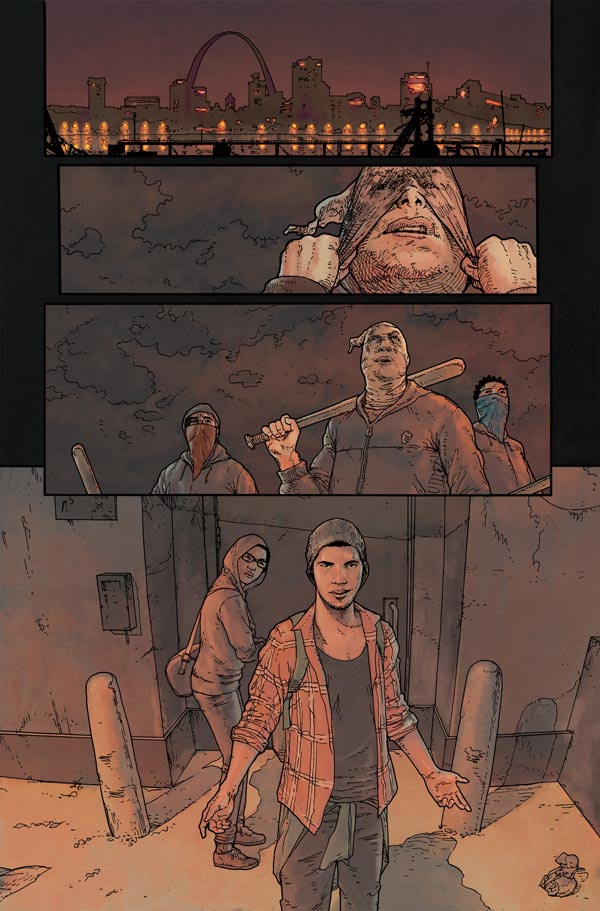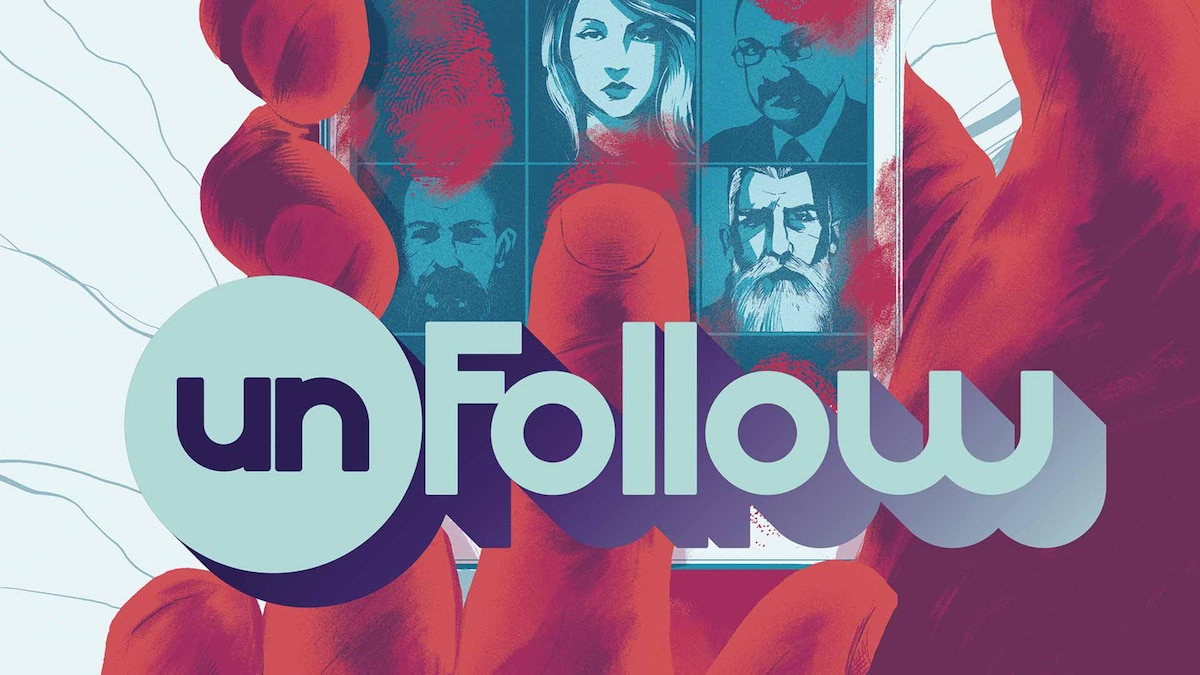Warning: This interview is more than 140 characters long.
Yes, we know 140’s the maximum when it comes to the social media tool that inspired Vertigo’s newest ongoing comic, UNFOLLOW, but that’s certainly not the case when it comes to that comic’s writer—Rob Williams. Smart, savvy and known for compelling, thought-provoking stories, Williams made his mark last year with Vertigo’s THE ROYALS: MASTERS OF WAR, an alt-history miniseries that imagined a World War II manipulated by super-powered leaders. But while The Royals looked to the past, Unfollow is very much focused on the now—namely, a world where online interaction shapes so much of our behavior that we’re at risk of losing our humanity.
To learn more about the inspiration behind his new series and to get a sense of what we can expect from it, we spoke to Rob about blending hashtags with horror and which of Unfollow’s characters he’d be following on Twitter.

What is Unfollow about? How would you describe it?
It’s a very zeitgeisty contemporary thriller for the social media generation. We all spend so much of our lives on Twitter and Facebook, and it’s changing the world. I just felt there was a story to be told about it. Someone was going to tell a story that was really “of the now.”
What I’m interested in with Twitter is how it brings out the good in you and the bad in you, just like any aspect of human communication. In our story, there’s a Mark Zuckerberg-type figure named Larry Ferrell, whom in our Unfollow world invented the equivalent of both Facebook and Twitter in his twenties, and he’s a billionaire. He very genuinely meant to bring humanity closer together through social media, but since then what he’s seen are all of the ugly aspects of humanity coming through.
Tragically, Larry gets terminal cancer, which is a really horrible twist of fate. He’s so young and he’s got it all, and then he finds out he’s going to die. So he puts out the social media equivalent of Willy Wonka’s Golden Ticket. He says to the entire world that he is going to split his money between 140 different characters, which is obviously a Twitter nod. Basically, check your phone and if an app with 140 on it turns up, then you’ve just won. When he dies, you’ll get a 140th share of his fortune.
So Larry brings them all together to his private island for a celebratory party, and they all think they’ve won the lottery because one 140th of his billions works out to something like $120 million each, so they never have to work again. Their lives have changed. But then Larry tells him that if one of them dies, the money will be spread between 139 of them instead—the share goes up. And similarly, if 139 of them were to die, one of them would get all the money.
Of course, the vast majority of these people would never do anything nasty to anyone. They’re just ordinary people. But suddenly that little seed is dropped in, and you know that within the 140 there are going to be certain people for whom that $120 million is not going to be enough. It changes their lives. Suddenly, you’ve got this money and what was originally a blessing and changed your life for the better, now you can’t walk down the road without looking over your shoulder. These 140 become celebrities, and the story offers a reflection of celebrity culture as well. But what it becomes is a little bit of a Battle Royale with a social media bend.

The first issue ends with the app showing up on these peoples’ phones, and you find out about the private island. But does the bulk of the series take place after the island?
The first arc is the introduction to them and how their lives have changed. They get taken to Larry Ferrell on his private island, and they have this fantastic party and get to know each other, and then the bombshell is dropped on them. So the first arc is us introducing the characters and the concept.
The 140 number may go down very quickly. The comic’s an ongoing, so as the story progresses, you’ll see these people go back out into the world. You’ll see some of their individual journeys and the crazy directions in which their lives go, which are not anything like what you would expect.
You said earlier that you wanted a story that was “of the now”—something that was inspired by social media. Why was this particular story the one that seemed right to you?
Mike Dowling, the artist, and I wanted to do a book together. We were talking about themes and the sort of ideas that interested us, and we’re both big Louis C.K. fans. There’s a Louis C.K. standup bit where he talks about how man got out of the food chain. That’s very much in this. This is putting human beings back in the food chain and the idea that effectively, we’re all sort of animals, just with handheld phones. Things haven’t changed that much from when we were all out in the plains, hitting each other with rocks to take each other’s things. There’s always the alpha predator. There’s Darwinism. There’s always people looking to rise to the top and the weak are going to be trodden underfoot.
I find that interesting, especially when you apply it to social media. You look at how people act on Twitter—it brings out the worst in people. It brings out the best in people as well, sometimes. But you see some really ugly behavior. That’s all in Unfollow.
You go on a train or any kind of transport, and you’ll see that people aren’t communicating. We’re supposed to communicate, but people are looking down at their phones. You see families in restaurants and diners, and no one’s talking to each other. Everyone’s looking down. The whole idea is that social media is supposed to bring us closer together, but in its own way, it’s driving us further apart as well.

Do you see Larry Ferrell as a good guy?
He believes this is an experiment. He wants to show the world what human beings really are. It could be good. If everyone just leaves each other alone and goes about their business, it’s a beautiful experiment. But personally, I think the guy’s bitter. He had everything, this incredible life, and then he gets terminal cancer. I think part of this is him lashing out at the world.
Tell us a bit about Dave. He’s one of the first characters we meet.
He’s an ordinary guy from St. Louis. He lives in a rough part of town, and he hasn’t got much. He’s very much our sort of everyman character. He’s our view in. Around him, you’ll meet a cast of characters who in some cases are really extreme.
Yes, you get that sense pretty quickly! Did you take any actual inspiration from Twitter in creating those characters?
Not really. Akira is a Japanese author who’s one of the world’s most famous authors and is this sort of recluse in Japan. He wrote a book years ago, which Larry Ferrell read, that kind of inspired Larry to do this entire thing. Akira has got prosthetic legs and a big facial tattoo, and at one point he attempted a coup on the Japanese government when he as at the height of his fame. He was almost a cult leader. During this coup, he hacked his own legs off on the steps of the Japanese parliament. But as he says when you first meet him, “That was different. I was insane back then.”
But he believes very strongly in peace. He wants to show that human beings are good, and that the whole thing is possible.

Then there are far darker characters. There’s Rubinstein, who’s wearing this sort of South American death mask when you first meet him. He’s Larry Ferrell’s head of security, but what you immediately find out is that all is not well. And then there’s a character named Deacon who’s an ex-special forces guy who speaks to God, but God seems to advise him to have an awfully lot of guns. So I’m not entirely sure if it’s the God that a lot of people would recognize. But he believes he has a mission.
You find through these different characters that they’ve all got different takes on this. There’s a spirit animal aspect to it as well, which I suppose is kind of the trippier aspect. Dave sees a leopard who talks to him and advises him in issue #1. There’s a real sense of the walls of reality kind of fraying at times.
Can we expect more of that?
Without giving too much away, you will see a sort of subjectivity to each person’s experience that might not be the norm. It’s something the visuals really sell, and I have to thank Mike Dowling and our colorist, Quinton Winter, who’s fantastic as well. It lifts thing. I just makes the book a lot more fun to sort of play with that type of thing.
So if these were real-life characters, which of them would you follow on Twitter?
I’d definitely be following Akira. He would have some very interesting things to say on Twitter, I believe. And occasionally some things that are quite bonkers.
UNFOLLOW #1 by Rob Williams, Mike Dowling and Quinton Winter will be available in print and as a digital download this Wednesday, November 4th.




















